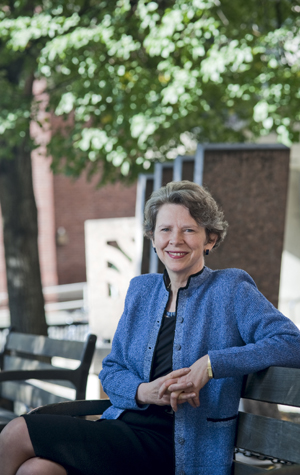Advocating for Women Scientists: BUSM Dean Wins 2013 Margaret L. Kripke Legend Award
 Karen Antman, Medical Campus provost and School of Medicine dean, has been awarded the 2013 Margaret L. Kripke Legend Award for Promotion of Women in Cancer Medicine and Cancer Research, which she calls a “tremendous honor.” Photo by Kalman Zabarsky
Karen Antman, Medical Campus provost and School of Medicine dean, has been awarded the 2013 Margaret L. Kripke Legend Award for Promotion of Women in Cancer Medicine and Cancer Research, which she calls a “tremendous honor.” Photo by Kalman Zabarsky
Karen Antman, provost of the Medical Campus and dean of the School of Medicine, has won the 2013 Margaret L. Kripke Legend Award for Promotion of Women in Cancer Medicine and Cancer Research. The award, which was given by the University of Texas MD Anderson Cancer Center, recognizes scientific and medical leaders who have made extraordinary efforts to hire diverse workforces, promote women to leadership roles, nominate women for awards, and help to advance their careers.
“Dr. Antman’s accomplishments set a very high bar that signals to women faculty that leadership positions such as hers are obtainable,” says Elizabeth Travis, associate vice president of women faculty programs at the MD Anderson Cancer Center. “Walking in Margaret Kripke’s footsteps, she’s an ideal Legend Award recipient.”
“The Kripke award is a tremendous honor,” says Antman. “Margaret Kripke is a pioneer who opened doors for me and many other women in medicine and science. As president of the American Association for Cancer Research (AACR), she gave me the first opportunity to be an AACR program chair, and I’ve always regarded her as a role model.”
An expert on breast cancer, mesotheliomas, and sarcomas, Antman developed a standard treatment regimen for sarcomas of the bone and soft tissue, and conducted groundbreaking research on blood growth factors. She has been an outspoken advocate on public health policy issues, and she fought for insurance coverage for patients involved in clinical trials. She has also testified before Congress on the need for federal research dollars to support cancer research.
Under Antman’s stewardship, MED strives to ensure that deserving women are nominated for professional awards and societies and pushes for a multicultural campus. Because studies show that diverse companies outperform those that are not diverse, Antman says, “achieving diversity among students, staff, and faculty can improve the learning environment for all.”
At MED, women make up 45 percent of the faculty, while the median for U.S. schools of medicine is 35 percent. Antman cites other efforts: MED reviews salary versus years-in-rank and regularly corrects outliers for both women and men, the school carries a banner in the Boston LGBT parade , and it has an Office of Diversity and Multicultural Affairs, led by an associate dean and several assistant deans.
“Among students, we are at the 85th percentile in the fraction of our graduates between 2006 and 2011 who are Latino and 75th in the fraction who are African American,” Antman says. “Our graduates consistently rate their instruction in culturally appropriate care for diverse populations above the 85th percentile.”
Before coming to the School of Medicine, Antman was the deputy director for translational and clinical sciences at the National Cancer Institute of the National Institutes of Health. She also worked for more than 10 years on the faculty of the Columbia University College of Physicians and Surgeons, where she was Wu Professor of Medicine and Pharmacology and was voted Senior Faculty Teacher of the Year by her medical residents. At Columbia she was also director of the Herbert Irving Comprehensive Cancer Center, a National Cancer Institute–designated cancer center. She has been on the faculty of Harvard Medical School and has had hospital appointments at Boston’s Brigham and Women’s Hospital, Dana-Farber Cancer Institute, and New York–Presbyterian Hospital.
Antman has served as president of the AACR, the American Society of Clinical Oncology, and the American Society for Blood and Marrow Transplantation. She was an associate editor of the New England Journal of Medicine for seven years and has been on the editorial boards of several other major medical journals.
The Kripke Award was established in honor of Margaret Kripke, a University of Texas professor emerita and distinguished scientist who achieved many firsts for women at MD Anderson, eventually becoming executive vice president and chief academic officer. Previous winners include Nancy Hopkins, the Amgen, Inc., Professor of Biology at the Massachusetts Institute of Technology, Edward J. Benz, Jr., president of the Dana-Farber Cancer Institute and director of the Dana-Farber/Harvard Cancer Center, and Janet Rowley, the Blum-Riese Distinguished Service Professor of Medicine, of Molecular Genetics and Cell Biology, and of Human Genetics at the University of Chicago Medical Center.
For young women in medicine, science, and academia, Antman has some advice: “Academia first requires being nationally or internationally recognized as an expert in your field,” she says. “Becoming such an expert in an emerging area of investigation is easier than competing with experts with decades of experience in established areas. Publishing and presenting your work at national meetings helps build your reputation. And serving on professional society committees also helps to keep you aware of what is going on nationally and internationally. Besides, it’s fun.”
This BU Today story was written by Amy Laskowski.
View all posts